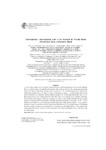Use este identificador para citar ou linkar para este item:
http://www.alice.cnptia.embrapa.br/alice/handle/doc/15578| Title: | Interdisciplinary paleovegetation study in the Fernando de Noronha Island (Pernambuco State), northeastern Brazil. |
| Authors: | PESSENDA, L. C. R.  GOUVEIA, S. E. M.   LEDRU, M. P.   ARAVENA, R.   RICARDI-BRANCO, F. S.   BENDASSOLLI, J. A.   RIBEIRO, A. S.   SAIA, S. E. M. G.   SIFEDDINE, A.   MENOR, E. de A.   OLIVEIRA, S. M. B. de   CORDEIRO, R. C.   FREITAS, A. M. de M.   BOULET, R. : FILIZOLA, H. F.   FILIZOLA, H. F.   |
| Affiliation: | Luiz C. R. Pessenda, CENA/USP; Susy E. M. Gouveia, CENA/USP; Marie-Pierre Ledru, Institut de Recherche pour le Développement; Ramón Aravena, University of Waterloo; Fresia Soledad Ricardi-Branco, Instituto de Geologia-UNICAMP; José A. Bendassolli, CENA/USP; Adauto de S. Ribeiro, Autônomo; Soraya Elaine Marques Gouveia Saia, CENA/USP; Abdelfettah Sifeddine, Institut de Recherche pour le Développement; Eldemar de A. Menor, Autônomo; Sônia Maria B. de Oliveira, Instituto de Geociêncas-USP; Renato C. Cordeiro, Autônomo; Ângela M. de M.Freitas, Autônoma; René Boulet, Autônomo; HELOISA FERREIRA FILIZOLA, CNPMA. |
| Date Issued: | 2008 |
| Citation: | Anais da Academia Brasileira de Ciências, v. 80, n. 4, p. 1-15, 2008. |
| Description: | The aim of this research was to reconstruct vegetation changes (with climate inferences) that occurred during the Holocene in the Fernando de Noronha Island, Pernambuco State, northeastern Brazil. The research approach included the use of geochemical (mineralogy, elemental), carbon isotopes (?13C, 14C) and pollen analyses in soil organic matter (SOM) and sediments collected in Lagoa da Viração and Manguezal do Sueste. The carbon isotopes data of SOM indicated that there was no significant vegetation changes during the last 7400 BP, suggesting that the climate was not the determinant factor for the vegetation dynamic. The pollen analysis of the sediment of a core collected in the Lagoa da Viração showed the absence of Quaternary material in the period between 720 BP and 90 BP. The mineralogical analysis of deeper layer showed the presence of diopside indicating this material was developed ?in situ?. Only in the shallow part of the core were found pollen of similar plant species of the modern vegetation. The geochemistry and isotope results, in association with the sediment type and pollen analyses of sediment samples of Manguezal do Sueste, indicated variations in the vegetation and in its location since the middle Holocene. Such variations can be associated with climatic events and sea level oscillations and also with anthropogenic events considering the last five hundred years. |
| Keywords: | Paleobotânica |
| Type of Material: | Artigo de periódico |
| Access: | openAccess |
| Appears in Collections: | Artigo em periódico indexado (CNPMA)  |
Files in This Item:
| File | Description | Size | Format | |
|---|---|---|---|---|
| 2008CP06.pdf | 751,26 kB | Adobe PDF |  View/Open |









